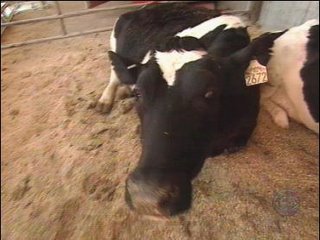You ready to eat cloned beef and bi products.
Cloned Meat, Milk Like Real Thing
WASHINGTON, April 11, 2005
Quote
"All parameters examined for the clones in this study were within the normal range of beef and dairy products approved for human consumption."Xiangzhong YangUniversity of Connecticut
AP) Meat and milk from cloned animals is essentially identical to that from animals that reproduced normally, a new study says.
The findings should ease safety concerns by both the public and regulators about eating cloned animals, said researcher Xiangzhong Yang of the Center for Regenerative Biology at the University of Connecticut. The study was published in Tuesday's issue of Proceedings of the National Academy of Sciences.
The Food and Drug Administration has asked the food industry to keep products from cloned animals out of the food chain while it considers their safety.
Cloning, the creation of an animal from the DNA of a single parent, should produce an animal identical to that parent. But as the technology has developed, many cloning attempts have ended in birth defects.
"All parameters examined for the clones in this study were within the normal range of beef and dairy products approved for human consumption," Yang said in a telephone interview.
Two beef clones were studied that had been produced in Japan from a famous Japanese Black breeding bull with superior meat marbling traits.
The 10 dairy clones were produced at the University of Connecticut from a Holstein cow that produced a lot of milk.
The researchers from Connecticut and the Kagoshima Prefectural Cattle Breeding Institute in Japan analyzed milk for a variety of factors including protein, fat, lactose and solids and studied more than 100 components in the beef, concluding that both were within the range of standards for milk and meat now consumed.
The FDA declined to comment on the findings but said it will include the report in the material it is reviewing on food from cloned animals. The agency said it expects its own safety assessment of these products to be released soon.
Asked for comment, Carole Tucker Foreman, director of the Food Policy Institute at the Consumer Federation of America, questioned whether the researchers had looked at the problem of stress in the animals.
Stressed animals are known to produce pathogens, she said, and there has been evidence that the offspring of cloned animals suffer increased stress. She said this study seems to avoid that question.
She also questioned whether the researchers, who specialize in reproductive biology, were a truly disinterested source of information, and suggested that the small number of animals in the study might not be enough to produce definitive data.
The study compared meat from two bulls and milk from four cows with the products from similar animals that had been produced by normal methods and raised in similar conditions to the clones.
The meat from the clones had a slightly higher marbling content than that of the comparison animals but that was the only significant difference, the researchers said.
Increased marbling is considered a benefit in beef and the researchers noted that the clones were produced from an animal renowned for its quality. The comparison animals were produced by inseminating cows with semen from the son of that bull, meaning that the offspring had only one-fourth the genes of their champion, while the clones had all of them.
No other significant differences were found in the meat or the milk.
The research was funded by the U.S. Department of Agriculture, Kagoshima Prefecture and the National Institute of Agrobiological Research of Japan.






0 Comments:
Post a Comment
<< Home